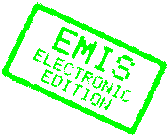On twin and anti-twin words in the support of the free Lie algebra
DOI: 10.1007/s10801-011-0339-8
Abstract
Let ${\mathcal{L}}_{K}(A)$ be the free Lie algebra on a finite alphabet A over a commutative ring K with unity. For a word u in the free monoid A \ast let $\tilde{u}$ denote its reversal. Two words in A \ast are called twin (resp. anti-twin) if they appear with equal (resp. opposite) coefficients in each Lie polynomial. Let l denote the left-normed Lie bracketing and λ be its adjoint map with respect to the canonical scalar product on the free associative algebra K\langle A\rangle . Studying the kernel of λ and using several techniques from combinatorics on words and the shuffle algebra , we show that, when K is of characteristic zero, two words u and v of common length n that lie in the support of ${\mathcal{L}}_{K}(A)$ -i.e., they are neither powers a n of letters a\in A with exponent n>1 nor palindromes of even length-are twin (resp. anti-twin) if and only if u=v or $u = \tilde{v}$ and n is odd (resp. $u =\tilde{v}$ and n is even).
Pages: 355–388
Keywords: free Lie algebras; combinatorics on words; shuffle algebra
Full Text: PDF
References
17. Addison-Wesley, Reading (1983) Michos, I.: On the support of the free Lie algebra: the Schützenberger problems. Discrete Math. Theor. Comput. Sci. $12(3)$, 1-28 (2010) Minh, H.N., Petitot, M.: Lyndon words, polylogarithms and the Riemann $ζ$function. Discrete Math. 217, 273-292 (2000) CrossRef Ree, R.: Lie elements and algebra associated with shuffles. Ann. Math. 68, 210-220 (1958) CrossRef Reutenauer, C.: Free Lie Algebras. London Mathematical Society Monographs. New Series, vol.
7. Oxford Science Publications, The Clarendon Press, Oxford University Press, London (1993)
